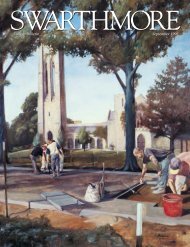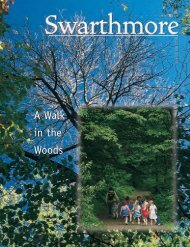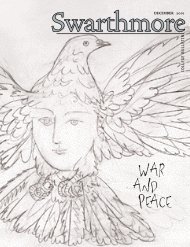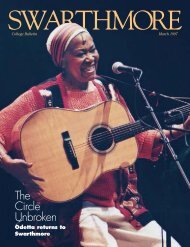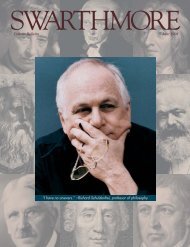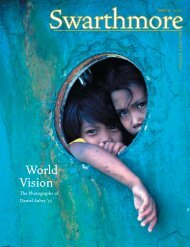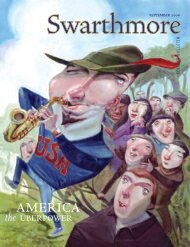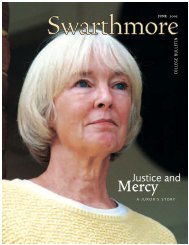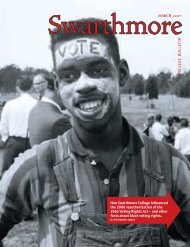C H A O T I C H A R M O N Y A Review by Karen Birdsall ’94Karen Birdsall ‘94 has been livingin Johannesburg since 2002. Sheis the research manager at theCentre for AIDS Development,Research and Evaluation, a SouthAfrican NGO specializing inresearch on social aspects ofHIV/AIDS.Truth in Translation is not aneasy theater experience—it iswhat South Africans would call‘hectic.’ The subject of the play israw and brutal, and the materialis delivered by the 11-personcast at a frenzied, relentlesspace that crowds out space forreflection. One is almost dizziedby the movement, the noise, theintensity of exchanges, and themultitude of languages.Various elements are woventogether in a way that is chaoticbut, somehow, also harmonious.Above the stage, grainy videofootage of the TRC hearings isprojected against a screen madeof T-shirts; below, the ensembleis in constant motion, all 11 castmembers on stage at once, continuouslyreconfiguring the setcomprised of modular metalunits that serve alternatively asdesks, billiard table, and bar.A small upstage contributes themusical glue.Anyone who has spent timein South Africa recognizes thepower of Hugh Masekela’s musicto capture this country’s particularmix of joy, sorrow, humor,expectation, injustice, andresilience. The music—alongwith the play’s occasionalmoments of humor and lightheartedness—areeffective ingently bringing together thediverse members of the audience,before releasing each person tograpple individually with theplay’s subject matter. Today,10 years after the TRC, a “newSouth Africa” may indeed beemerging, but for the raciallymixed audience at the MarketTheatre, the story being told onJEFF BARBEE/BLACK STARstage resonated very differentlydepending on one’s own historyin this country.With so much to absorb, Ifound myself focusing intentlyon a few of the 11 characters,studying their distinct personas,examining their movements,reactions, and facial expressions.Each character proceeds throughan individual journey, from thenaïve excitement of landing ajob as a translator, through therealization of what the work willentail, to the coping methodsneeded to get through it. Manyof the characters uncover a personalconnection to a politicalpast: What began as somethingabstract gradually takes on avery real meaning. Some losethemselves in drink. Somerepress the emotion for as longas they can. Some knit furiouslyand silently.The play contains a numberof particularly charged moments—the“comforter’s”wrenching song at the close ofthe first act, the re-enactedinterrogation between a blackand white interpreter, the cantankerousbartender throwing hisson’s ashes across the stage. YetJEFF BARBEE/BLACK STARfor me, the most intense andpowerful moments came duringthe scenes that depicted thehearings themselves, when eighttranslators interpreted simultaneously—somespeaking English,others isiZulu, Sesotho, isiXhosa,Afrikaans…. There was no coherentstory to follow, only a cacophonyof overlapping phrases,translated sentences, painfulaccounts of torture, abuse, andloss, spit out like bullets in multiplelanguages all at once.I was gripped by the expressionson the translators’ faces.Anyone who has translated atlength from one language toanother knows the intense concentrationrequired to performthe role, but few people haveneeded to translate as theydid—speaking in first person,alternating between the words ofaccused and accuser, becoming aconduit for wretched stories andsoulless excuses, speaking with amatter-of-factness that beliedthe gruesome testimony. Theeight translators, with theirhands cupped over imaginaryearpieces, stared blankly intospace, listening intently to thevoices in their ears. Yet the horrorwas just below the surface,and it came spilling out whenthey switched off the interpretingdevices, crumbling intothemselves and sometimes intoone another.Although the Truth andReconciliation Commissiontranslators had a mandate tobe impartial channels,inevitably they absorbed thestories of the perpetratorsand victims of apartheid—truth and lies, healing andhorror. They could not hide,and denial was not an option.PHOTOGRAPHS COURTESY OF <strong>TRUTH</strong> IN TRANSLATION PROJECT20 : swarthmore college bulletin
JEFF BARBEE/BLACK STARHe says he now sees that even the Ph.D. inpsychology, which he had long considered awasteful detour, has impacted his method oftraining actors, in which they learn to shifttheir gazes and see the part of another person’sface that is old, that is young, that isevil, that can be loved. “Acting becomesreacting.”“I think,” says Eldridge, “what he’s doingis teaching.”Lessac, like many artists and scholarsaround the world, sees South Africa’s TRCas a great success story: “The place was supposedto blow itself up. The whole worldwas waiting for it.“I still believe that something very specialhappened because they just had theballs to put it on the table and tell theirstories.”Admiring the TRC has become a cottageindustry of sorts, says Associate Professor ofHistory Tim Burke, Swarthmore’s Africanhistory scholar. “You can feel overwhelmedby the amount of attention it’s drawn. ThereMichael Lessac is a man whohas found his message to theworld and wants nothing morethan to pass it along.are so many people writing about it, somany people concerned about it; there arebooks and plays and poems.”“One of the reasons it has attracted somuch criticism and so much interest andappreciation is that it is unprecedented inmultiple ways. The nature of transition fromcolonialism to postcolonialism in Africa hasbeen pretty close to universally unsatisfyingand has led mostly to unsatisfying results.Given that context, it would have been a terribleidea to do it [in South Africa] as everyoneelse had done it.”But the TRC, unique as it may be, is mostwidely admired from afar, says Charles Villa-After Swarthmore, Lessac (above, atJohannesburg’s Market Theatre) earneda Ph.D in psychology—a subject hetaught at the college level until 1974,when he started the Colonnades TheaterCompany in New York. Later, he was asuccessful television director, with morethan 200 shows to his credit.Vicencio, director of the Institute for Justiceand Reconciliation in Cape Town, SouthAfrica, and formerly the head researcher forthe TRC. Its lower standing among SouthAfricans somewhat contradicts the commission’shigh stature abroad and has left it vulnerableto criticism—most notably the complaintthat the TRC should have focused lesson truth-telling and more on allocatingcompensation, says Burke. Meager reparations,over which the commission had onlythe power to offer recommendations—andthe slow pace of land reform, which is stillunderway—are frustrating to many SouthAfricans, adds Burke.december 2006 : 21



